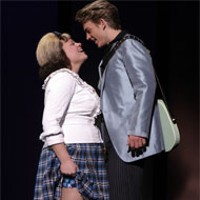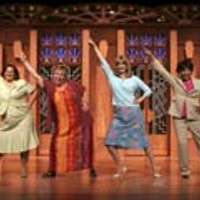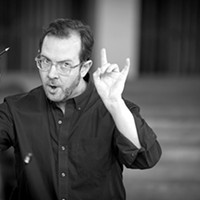It's not that Hwang isn't otherwise occupied these days. While Moss was overseeing lighting placements at Booth, Hwang was getting set for last Thursday's Broadway premiere of his script rewrite for Rodgers & Hammerstein's Flower Drum Song. That audacious, high-profile project was no doubt what kept Hwang away from the Syracuse run that began on September 18.
"I talked to him on the phone about two weeks ago," Moss reveals, "and he was so excited. He said he'd read all of our reviews online, and he was thrilled. And he said it sounded like a very different production. He was so generous. I mean in the middle of his own opening, he was like bothering to call us and give us his best wishes. And he said, "I'm definitely coming to see it.'"
Hwang's right about the new production being very different, Moss maintains. His starting point has been the text, not the original Broadway production. Some of the emphasis has been shifted away from the sensational intrigue and deception that dominated the Broadway concept, Moss tells us. Both of the true-life characters who were the basis for Hwang's protagonist Gallimard and his paramour Song Liling, French diplomat Bouriscot and Chinese opera singer Shi, earned six-year prison terms after their 20-year escapade.
"We've had a slightly stronger emphasis on the themes of Vietnam and the West simply understanding the East in any way," Moss offers, "which couldn't be more prescient, given what our president is doing these days. All we'd have to do is change the words to North Korea, and you'd think this play was written yesterday. I mean it's so timely it's amazing."
A few years ago, Actor's Theatre of Charlotte loaded Butterfly onto their season schedule, but their inability find a local actor for the pivotal character of Song forced them to toss it overboard. According to Moss, a five-month national search was necessary to find the opera temptress for the 1988 Broadway production.
"We didn't have that kind of money or time," Moss admits. "But we had a great casting person, and the play is now famous, so lots of actors made themselves available."
Broadway vet Allen Fitzpatrick stars as Rene Gallimard, his first Charlotte appearance since 1999 when he portrayed Petula Clark's butler in the touring version of Sunset Boulevard. J LaRue, a New York pro by way of the U of Florida, is the alluring Lilling.
Auditions and design meetings were held up in New York, but Charlotte Rep's new producing director, Michael Bush, has been an invaluable collaborator, according to Moss.
"Directors lose objectivity faster than any other artist," he explains, "because we get involved with solving an actor's problems, and then we think we've solved the scene's problems. So it's always wonderful when you have someone who's bright and sensitive who'll come to your rehearsal and give you some feedback. But sometimes, somebody will give you feedback for their idea of the play. What was wonderful about Michael's notes was that he was giving me insights into exactly where I wanted to go."
In Moss's mind, the New York-to-Charlotte connection was cemented the first time Bush attended a run-through up in Syracuse.
"There's a scene in Act 1 where a young woman is supposedly stripping in a window to excite our hero," Moss recalls. "While the scene was taking place, I saw Michael taking a note. And I thought to myself, Oh, God, I bet he's going to want her to turn all the way around. I was really apprehensive. Then when we got to talk afterwards, his note was, "I hope she doesn't turn around!'"
M. Butterfly continues its run at Booth Playhouse through November 10.
sorrowful chauvinistSydney Andrews and Jill Bloede are part of the cast in Children's Theatre of Charlotte's production of The Canterville Ghost which continues through this weekend with performances on Friday, Saturday and Sunday.Seems like the former lord of the Canterville estate once disapproved of the way his wife laundered his ruffs. So he murdered his consort at the foot of the main staircase in a most ungentlemanly fashion. Well, her family was none too pleased -- and brutal in its vengeance.Not the typical foundation for a Children's Theatre yarn, but this is the Halloween season, our ruffled chauvinist swine has learned his lesson, and The Canterville Ghost looks and sounds very much at home at Spirit Square. The spooky design is extraordinary.
Taking his cue from Edward Gorey, scenic designer Kevin Raper makes the Canterville interior into a black-and-gray witches' brew of dark passageways, flickering sconces, cobwebbed chandelier, and a huge pendulous moon that doubles as a projection screen. The ruined residence is suitably accessorized for mysterious entries, exits and assorted hauntings. We're not to be deprived of spinning paintings, a falling row of books, glowing blood stains in multiple hues, secret panels, a suit of armor, and a whole wall that swivels to reveal a fiery sanctum.
Eric Winkenwerder works his usual magic in lighting the perpetual storms and ghostly visitations, but for once he's upstaged by the sound effects of Gary Sivak, which seem to float as eerily through the hall as across the stage.
All of this technical wizardry -- plus the mischievous stage direction of Alan Poindexter -- is lavished upon a Marisha Chamberlain adaptation that only fitfully rises above mediocrity. It's hard to believe that Oscar Wilde, when he wrote the original tale, would have thought the ghost's crime to be so trivial. Certainly if he'd adapted his brainchild for the stage, he would have made the lesson that the ghost learns after centuries of suffering more profound and powerful.
He finally veers toward redemption when his distant descendant, Lord Canterville, sells the estate to a family of plucky Americans. Even as the youngest of the Otis brood are scaring the ghost with cap pistols, the eldest daughter is tendering the sympathy he truly craves -- while beguiling the duke next door.
Mark Sutton, wearing an asymmetrical Walter Raleigh get-up (and a mic that deeply echoes his voice at strategic moments), makes a tasty meal of the ghost role -- though he's bogged down in some awfully banal dialogue with the precious Otis daughter (Sydney Andrews). Jill Bloede pretty much steals the show as the starchy servant, Mrs. Umney. Hilariously channeling Judith Anderson's Mrs. Danvers, Bloede is adorably decked out in a Lily Munster wig -- with wicked striping Yvonne de Carlo never dreamed of -- poufed so high she must crouch to get through the lower portals.
Children will savor the script more than their parents when it descends to the cartoon level, but the fine acting and special effects will delight everyone.
Amid the musical bounty of Mozart's Marriage of Figaro, it's easy for companies assembling their quintet of singing frontliners to shortchange the rich and intricate plotting of da Ponte's magnificent libretto. With Opera Carolina maestro James Meena ably taking care of business in the pit last week -- and penning the frisky supertitles -- stage director Bernard Uzan had free rein in keeping the comedy at the same giddy level as last spring's Barber of Seville.Uzan also was reaching for the satire of Beaumarchais' original Figaro, banned in pre-revolutionary France, that Mozart and da Ponte discreetly muted from their opera in 1786 to appease the Emperor of Austria. The stage was flanked with towering reproductions of two revolutionary documents, the American Declaration of Independence of 1776 and the French Declaration of the Rights of Man and Citizens of 1789. When peasants and nobility were set to converge at the wedding feast, the invitation to Marie Antoinette's nuptials filled up the back wall.
So we paid close attention to the plot and occasionally saw the comedic conflicts as eternal class conflicts. But there was plenty of the familiar pleasure in the music.
Baritone Dean Peterson, solid last season as the lusty preacher in Susannah, was even better turning to the comedy of Figaro. He towered over soprano Indira Mahajan, making a charming debut as Fig's fiancee, Susanna. Both were more consistent vocally than Brenda Harris and Christopheren Nomura singing the nobles. Harris was so wobbly in her Act 2 entrance that OC's magnanimous subscribers withheld their applause, but she was absolutely stunning in the Contessa's Act 3 lament. Nomura's vocal valleys weren't nearly as deep, and his vile advances as Almaviva were smoothly elegant.
Lori-Kaye Miller was near perfection as flirtatious troublemaker Cherubino, and Deborah Fields as Marcellina was the funniest of the three old fogies, sporting a seismic bustle. It will be fun to see Fields -- and Peterson -- in OC's upcoming Cold Sassy Tree.
Speaking of Arts_performance.html
-

Sailing With Hamlet
Jul 20, 2005 -

Proud To Be Plump
Jul 6, 2005 -

Putting The Sell In Cellulite
Jun 29, 2005 - More »
Latest in Performing Arts
More by Perry Tannenbaum
Calendar
-

NEW WINDOW GALLERY-Pat Rhea-ACRYLIC PAINTINGS-April 05-30 2024 VALDESE, NC 28690 @ New Window Gallery/Play It Again Records
- Through April 30, 12 p.m.
-
Derek Hough - Symphony Of Dance @ Ovens Auditorium
-

"Blood Residue Analysis of Paleoamerican Stone Tools in the Carolinas" @ Native American Studies Center
- Fri., April 26, 12-1 p.m.
-

ARTS RENAISSANCE, a GALA supporting the ARTS in South Carolina @ the Columbia Museum of ART
-
 The Piano Guys @ Ovens Auditorium
The Piano Guys @ Ovens Auditorium
-
The death of CAST 5
What really happened to Charlotte's beloved experimental theater company?
-
Jessica Moss Makes the Gantt Center a Safe Zone for Local Artists 2
Flipping the script
-
Charlotte ink 7
Behind the pain with a trio of the Queen City's finest tattoo artists














